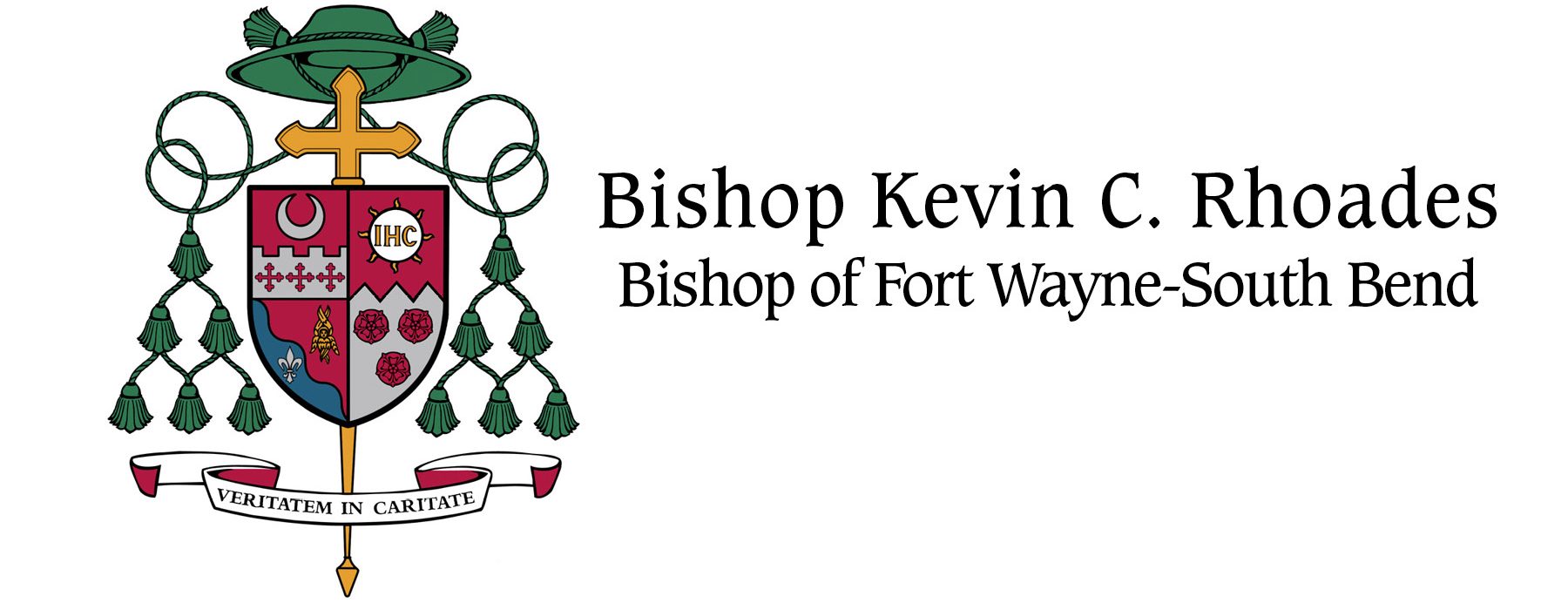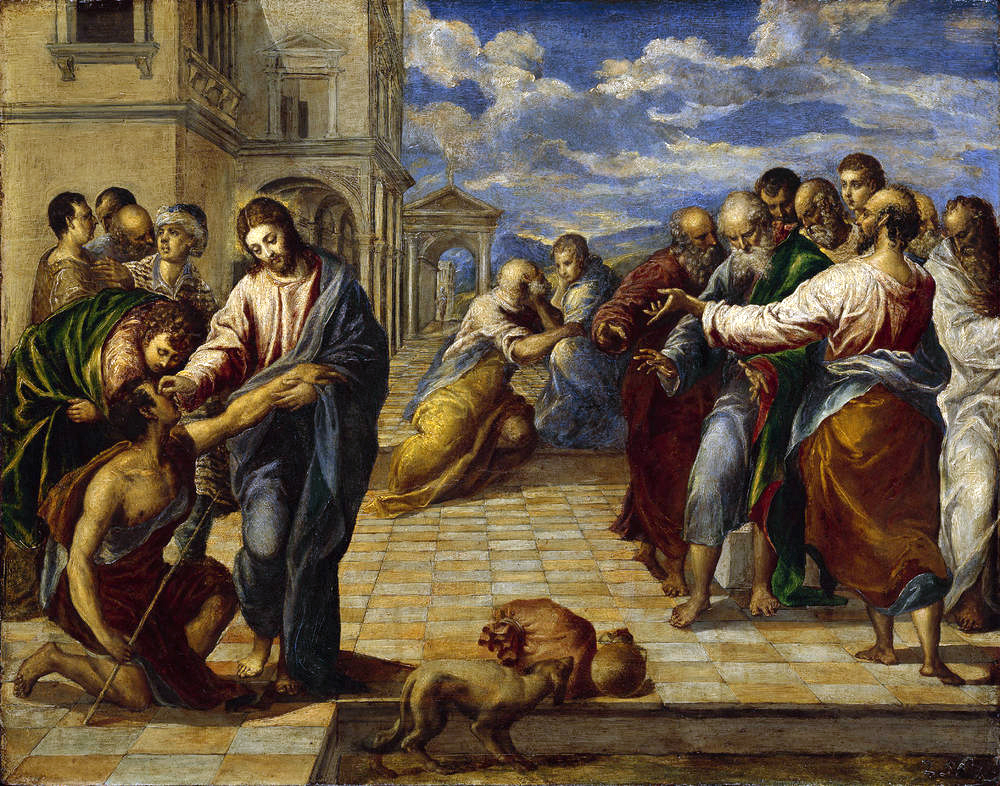March 24, 2020 // Bishop's Column: In Truth and Charity
‘May Jesus, the light of the world, lead us on’
The following homily was given by Bishop Kevin C. Rhoades March 22, 2020, on the Fourth Sunday of Lent, during a livestreamed Mass at the Cathedral of the Immaculate Conception, Fort Wayne.
How strange it is to celebrate Sunday Mass in an empty cathedral. Yet, I am keenly aware that, though physically separated, we are spiritually together through our prayer, our faith and our love. And at this Mass, we are connected online. Thank you for spiritually connecting to this Mass, which I offer for all the people of our diocese.
Together we walk in the dark valley of the coronavirus pandemic, but we walk by faith, faith in the care of God, our Good Shepherd. We prayed in the Responsorial psalm: “The Lord is my shepherd; there is nothing I shall want.” With faith, we pray with the psalmist: “Even though I walk in the dark valley, I fear no evil; for you are at my side with your rod and your staff that give me courage.” The courage of faith! May the Holy Spirit give that courage to all of us during this time. May this courage of faith sustain all those who are sick, all those who are worried, all those who are hurting!
Today’s Gospel of the healing of the man born blind teaches us much about faith. It is the story of a simple and sincere man who was blind from birth and about his journey of faith. At first, he encountered Jesus as a “man” among others. When the people asked him “How were your eyes opened?” he simply replied, “The man called Jesus made clay and anointed my eyes and told me, ‘Go to Siloam and wash.’” Later, when some of the Pharisees interrogating him said that Jesus was not from God and was a sinner because He violated the Sabbath, the blind man objected and said that “Jesus is a prophet.” His faith was growing. The Pharisees then continued to interrogate him, insisting that Jesus was a sinner. With courage, the blind man responded: “If this man were not from God, he would not be able to do anything.”
Notice how the blind man’s faith was growing, first referring to Jesus as a man, then as a prophet, and then as a man from God. Hearing this, the Pharisees threw him out of the synagogue. When Jesus heard about this, He went to find the blind man and, when He did, Jesus asked him: “Do you believe in the Son of Man?” This is the moment when the blind man’s eyes were truly opened. He was given spiritual vision. He was able to see with the eyes of faith and thus called Jesus “Lord.” He said to Jesus: “I do believe, Lord.” His faith had grown to the point that, as the Gospel tells us, he then worshipped Jesus.
What a beautiful story of growth in faith! The man who was healed of his physical blindness was also cured of spiritual blindness. His eyes were opened by faith. Sadly, the Pharisees remained in spiritual darkness. They were spiritually blind and would not open their eyes, their minds, or their hearts to Jesus, the light of the world.
We who were enlightened by Christ at our Baptism can be tempted to return to spiritual darkness, to be spiritually blind like the Pharisees. This happens when our hearts become hardened to the truth of the Gospel, when we are blinded, for example, by selfishness. We need to ask the Lord to cure us from the darkness of sin and pride. The Pharisees suffered from spiritual blindness. They were blind to the Holy Spirit. They had the externals of religion but lacked the spirit of Jesus’ love. They were also blind to the suffering and pain right before their eyes. They refused to rejoice in the healing of the blind man. They were blinded by their fixation on the law and Jesus healing on the Sabbath. How easily we can be blinded by legalism and forget or ignore the very heart of Jesus’ life and teaching, which is love.
This past week, the Rector of the shrine at Lourdes in France, was asked about the anger of some people who objected to the closing of the shrine and of churches throughout Europe. He responded that “the first duty of a faithful Catholic is charity, which means we don’t put other people in danger.” He said: “We cannot stand next to each other, in order to avoid spreading the virus, so if the sanctuary became a place where these protection rules were broken, then we wouldn’t be respecting this imperative of charity. It is as simple as that.”
Though our churches here are not closed — at this time, people can still come and pray before the Blessed Sacrament — but we cannot gather together for Mass. This is really fulfilling our duty of charity, so that we don’t put people in danger and we can help stop the spread of the coronavirus. I was thinking: isn’t this what the Holy Eucharist teaches us? The Eucharist is the sacrament of charity. Though one cannot receive the Eucharist at this time, one can live the Eucharist! We do so by our love, by not doing things that would hurt others by spreading the virus, by following, not ignoring, the directives of our health care experts. We do so by our prayers during these weeks for all those who are sick and suffering from the virus, for those who have died and for their families and loved ones. We do so by our prayers and support for our doctors, nurses, and health care workers. We do so by our reaching out with love to those who are afraid, who are alone, and who are in need.
This is the time to truly live our faith, to live the Eucharist which we have been so privileged to be nourished by throughout our lives. We must not be spiritually blind like the Pharisees, or shortsighted, self-centered, thinking only of ourselves. This is a time in which, by God’s grace, our faith can grow deeper by our prayers and our charity and our families can grow closer with more time at home together. Let us trust that Jesus our Savior illuminates all that is dark in life. He leads us to live as “children of the light.” As we heard in the reading from St. Paul’s letter to the Ephesians: “Live as children of light, for light produces every kind of goodness and righteousness and truth.”
Finally, I end this homily with words of the recently canonized saint, Cardinal John Henry Newman, words of a beautiful hymn that he wrote before he became Catholic, in a time of great distress in his life, asking God for light when he was lonely, confused, and very sick. “Lead, kindly Light, amid th’encircling gloom, Lead thou me on; The night is dark, and I am far from home; Lead thou me on: Keep thou my feet; I do not ask to see The distance scene – one step enough for me.”
Brothers and sisters, may Jesus, the light of the world, lead us on. Let us trust in Him. May His light renew our Christian love as we journey to Easter and the Resurrection!
The best news. Delivered to your inbox.
Subscribe to our mailing list today.







